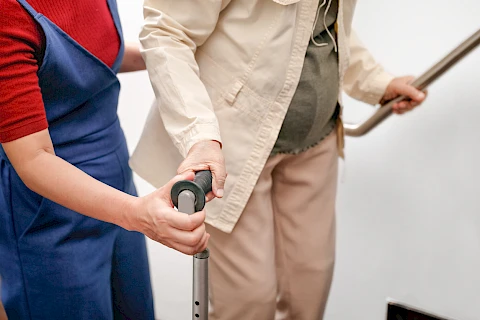
Home safety becomes increasingly important to us as we age. For seniors, ensuring their living environment is as safe and accessible as possible can significantly improve their quality of life. Today, we'll guide you through key areas of home safety for seniors, focusing on fall prevention, fire safety, and accessibility.
1. Living Room Safety
We spend a lot of time in our living rooms, so it's at the top of our list for home safety for seniors. Start by removing trip hazards such as rugs, cords, and clutter. Tidy up any cords stretched across walkways by securing them along the edges of the room.
How good is the lighting? Ensure light switches are easily accessible as seniors enter the room. Furniture layout should also support easy movement, with clear pathways and sturdy support, and should be easy to enter and exit. Secure bookcases to the wall to prevent them from tipping over, and store frequently used items within easy reach.
2. Kitchen Safety
Kitchens are filled with potential hazards, making them another essential aspect of home safety for seniors. Don't slack on fire safety—clear any flammable items away from burner tops. Regularly check and maintain appliances to avoid electrical mishaps.
Organizing cabinets smartly can also make a big difference. As with living room storage, keep frequently used items within easy reach to avoid the need for step stools or ladders. Remove any loose rugs and consider installing non-slip permanent flooring if the budget allows.
3. Bathroom Safety
The bathroom can be a particularly hazardous area for seniors. Installing grab bars in the shower and near the toilet can provide much-needed support. Many seniors also often find raised toilets to be easier to use. To prevent scalding, check water heater settings. The temperature shouldn't exceed 120°F. Ensure the bathroom is well-lit! Nightlights will help seniors navigate those nighttime visits.
4. Bedroom Safety
The bedroom is also a crucial area for home safety and should serve as a comfortable, secure haven for seniors. Bed height is important; it should be easy to get in and out of the bed. If that's a trouble spot, look into getting a bed rail for extra support.
Keep pathways clear of any clutter, and ensure the room is easily navigable even in the dark by installing nightlights or lighting systems that operate with voice signals. A light near the bed that's easy to turn on can help prevent falls if seniors need to get up during the night.
5. Hallways and Staircases
Hallways and staircases can be accident-prone areas if not properly maintained. Make sure that handrails are secure and in good condition. It's also important to ensure pathways are free of any obstacles and have plenty of light.
Stairlifts or ramps can make stairs more accessible and significantly reduce the risk of accidents for seniors with significant mobility issues.
6. General Home Safety Tips
Here's what you need to do to make sure you're safe and sound at home:
- Install smoke detectors and carbon monoxide alarms, and check them monthly.
- Purchase and learn to use fire extinguishers.
- Keep water detectors near water heaters, which should be regularly serviced.
- Keep emergency contact information visible and easily accessible.
- Have the home's furnace professionally serviced each year.
- Have clothes dryer vents cleaned out every six to 12 months.
- Clearly label hazardous cleaning solutions and other toxins.
Stay Safe at Home With Senior Helpers
Regular home safety checks can significantly reduce the risk of accidents and injuries for seniors. By implementing this checklist, you're taking proactive steps to create a safer home environment either for yourself or a loved one.
If you or a senior loved one needs assistance with household chores, meal preparation, or medication management, Senior Helpers West Jacksonville can help. We proudly serve Jacksonville, Orange Park, Middleburg, Fleming Island, and Green Cove Springs. Contact us today!